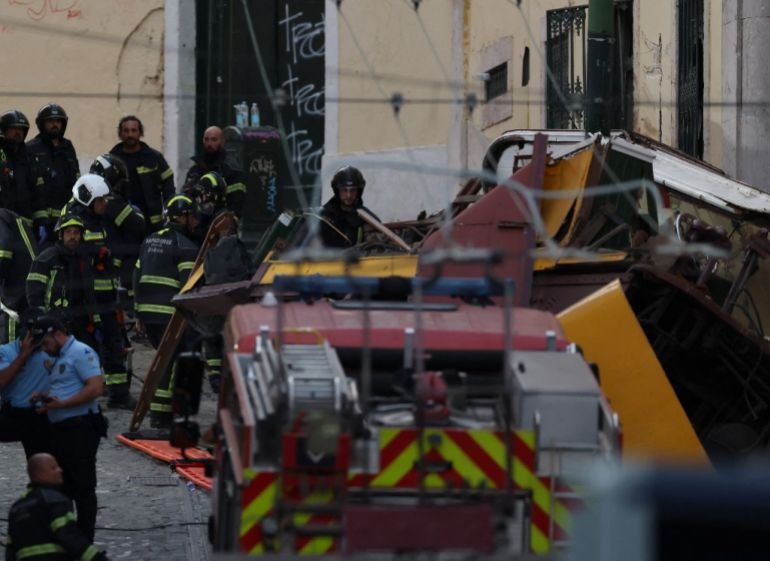Top Stories
Audiences Disagree On Movie’s Meaning

[This story contains spoilers for Weapons.]
Zach Cregger’s Weapons is the latest horror success story in a year when epic studio horror films with large casts and even larger ambitions have thrived, like Sinners, Final Destination: Bloodlines and 28 Years Later. After eclipsing box office projections and sending enthusiastic audiences home with heightened pulses and more than a few chuckles (at least until all the lights go off and only the nightmares remain), Weapons has dominated film-centric conversations on social media for days.
Cregger’s twisty tale features a unique tapestry of intersecting characters played by Julia Garner, Josh Brolin, Alden Ehrenreich, Benedict Wong, Austin Abrams, and Cary Christopher, all caught up in the mysterious disappearance of 17 children.
It’s no surprise the film has led to discussions about its deeper meaning. But the most frustrating point among them is the argument shared by several critics and a wider collection of the audience that the film doesn’t have a deeper meaning and is ultimately about nothing. Rather, the argument goes, audiences are placing meaning into the film because years of so-called elevated horror have trained them to expect —and thus look for — surface-level meaning. It is a claim that I find not only false but anti-analytical because of course Weapons is about something. It’s about so many things that to even limit it to one feels reductive.
It is both a blessing and a curse that we have so much access to the thoughts of artists by way of the internet and social media. On the one hand, it makes the intentions of an artist harder to misconstrue. On the other hand, it has made us complacent thinkers. Websites and Reddit threads spoon-feed audiences with headlines like “What Does the Ending of This Movie Mean,” and if it’s not that, its journalists writing full summaries of a film’s ending so that folks can lend their voice to the discourse without even needing to have seen the film in question.
As a film-going culture, we’ve lost some of our curiosity in an effort to find homogeneous and simplified answers, when in many cases simple answers aren’t even the priority for most filmmakers.
Cregger spoke recently to The Hollywood Reporter about the inception of Weapons, and he described it as an emotional reaction to the death of his best friend and trying to process that loss. Though Cregger has not named his friend in any of his interviews, those familiar with Cregger’s work agree that he’s talking about Trevor Moore, the beloved comedian, musician, and filmmaker who was a founding member of the comedy troupe The Whitest Kids U’ Know (WKUK), along with Cregger. Weapons was released on Aug. 7, the fourth anniversary of Moore’s death.
Beyond the film’s consideration of loss, it’s also genuinely and intentionally funny. There is character-driven humor and pointed reminders of the absurdity of life that feels like a successor to some of WKUK’s sketch comedy moments.
Going further back into his personal life, Cregger also revealed that the final chapter of the film with Alex (Christopher) and his parents was inspired by his father’s alcoholism, as well as his own. “The idea that this foreign entity comes into your home, and it changes your parent, and you have to deal with this new behavioral pattern that you don’t understand and don’t have the equipment to deal with,” he told THR. Through Cregger’s lens, Weapons is, in part, about loss and alcoholism. He figured out what it was about during the writing process, while still not having answers for everything, like the giant AK-47 that floats above Archer Graff’s (Brolin) house.
Undeniably, Weapons is about something. But it’s also important to emphasize that Cregger’s lens is not the final statement on the film and doesn’t negate other viewpoints.
There is this rush to deny any other readings of the film with common refrains like, “Actually, Cregger said it’s about this,” or “You’re reading too much into it.” While Weapons is clearly personal to Cregger, it’s not a private journal entry. It is public art, something given to audiences so that they may apply their own lens to it.
It’s profoundly silly to argue with folks who say Weapons is about gun violence and gun control, child trafficking, the breakdown of communities, and warring community leaders. Because how often do we look at art as being one thing, or existing solely what the filmmaker says it is? If we did, there would be a lot less writing on the works of Bob Dylan and David Lynch. We’d have to agree with William Friedkin that The Exorcist is not a horror film and deny crucial conversations surrounding AIDS because David Cronenberg said that wasn’t his intention. Intentionality is an interesting road to travel down, but far less interesting when it comes to the staying power of art.
Before I read any interviews or theories on Weapons, I sat with the film and considered how it made me feel and what it made me think about. The most recurring images I conjured were that of Hansel and Gretel and the breadcrumbs leading to the witch’s house. Only in this case, the breadcrumbs were left in vodka bottles, used syringes, and cherry red paint.
For me, Weapons is a fucked-up fairy tale that plays with childhood fears of strangers, old people, wigs, and getting lost, that then finds a way to drag the classic horror archetype of the witch, Aunt Gladys (Amy Madigan) into contemporary times to prey parental fears — fears of your own child being killed, or kidnapped, or vanishing because so many outside forces, the internet, their peers, their teachers, that vie for our children’s attention and have such an inexplicable hold on them that it feels close enough to witchcraft.
The central source of anxiety I found in the dark basement of Weapons was the question of Who is shaping our children and what are they being shaped into? We’ve certainly seen the influence people like Andrew Tate, Jordan Petersen, and Ben Shapiro have had on poisoning young minds, and raising them on tenets of misogyny, racism, greed and self-interest. I’d be hesitant to call what they’re doing anything less than weapons manufacturing meant to harm our society.
My Heat Vision colleague Brian Davids and I discussed a somewhat different take on what Weapons is about. He said, considering the film’s ending, Weapons is about “the younger generation turning the tables on the older generation after suffering the effects of either their trauma or the trauma they create by upholding harmful systems and legislations.” Essentially, Aunt Gladys serves as a representative of that older generation, feeding off the young to stay in power.
In the children’s final acts of defiance, they tear Gladys limb from bloody limb, effectively ending her reign of terror and freeing themselves for what Davids ultimately refers to as an anti-generational trauma film, a concept that I believe is supported by the film’s final lines, “some of them even started talking again this year,” suggesting that they’re able to heal from their experience.
In some ways, Weapons works as the opposite of Longlegs, which was concerned with how parents often hide things from their children, only for those children to be traumatized years later when they discover these hidden secrets, and then later pass that trauma onto their children in an unending cycle. Weapons seems to break such cycles, leaving no more devils hiding in basements or upstairs bedrooms playing with dolls or ribbons of hair.
In an interview with The Playlist Cregger said, “I wasn’t trying to comment on or even tap into collective societal tragedies… wasn’t thinking, ‘Oh, America,’ at all.’ Yet, for those who see America in Weapons, as I do, as Brian Davids does, and countless others do, they aren’t wrong.
Going back to that THR interview, Cregger dropped this nugget of truth: “it’s not really my business what people make of the movie. I have nothing to say about it, because the movies should speak for itself, and if I have to comment on what people should get from it, then I’ve failed as a filmmaker.”
In seems to me that many of us are concerned about beating movies, solving them before others and then being afraid to get the “what was it really about?” question wrong in front of judgmental peers. But ultimately, I believe that’s a disservice to film analysis, and to the films themselves. We’ve weaponized the idea of being right or wrong about movies, and it’s a boring state to be in. There’s no harm done in taking an educated analytical swing in good-faith, because every piece of art is about something, many things, and that’s what keeps art alive.
Top Stories
Donald Trump is having a lovechild with Satan: South Park sets up future chaos | South Park

So far, South Park’s 27th season has had one clear goal: to provoke Donald Trump into a tantrum. Every episode has managed to pick on a new and different facet of his authoritarian rule – the silencing of his media critics, his use of Ice agents as an intimidation tactic – while simultaneously telling everyone what a tiny penis he has.
So the anticipation levels were off the charts for this week’s episode, entitled Wok Is Dead, which promised to take on Trump’s tariff policy. And in fairness it did do this, but only in a couple of scenes where a Chinese character with an uncomfortably Mickey Rooney-esque accent complained about them. The rest of the episode just settled for a bunch of jokes about Labubu dolls, as well as calling Donald Trump “Satan” as many times as it feasibly could.
For the most part, Wok Is Dead found itself split in two. The bulk of the episode was taken up with a very traditional South Park storyline about a cultural fad pushed to extremes. Everyone at South Park Elementary has become obsessed with Labubu dolls, a line of vaguely creepy collectible plush dolls sold in mystery boxes. In real life, the Labubu craze has been ramped up to the level of fidget spinners and loom bands before them, prompting the market to be flooded with a rush of carelessly manufactured fakes that potentially pose a danger to children.
In the world of South Park, however, the dolls prompt satanic rituals, with children sacrificing poultry and summoning plagues in their desire to find ever-rarer dolls, much to the dismay of Jesus, who is serving as the school counsellor. And that’s about it for that particular storyline. It’s South Park by numbers: find something newly popular, mock it for 20 minutes, and then go home.
But that isn’t why people have been watching South Park in record numbers this year. No, they’re doing that because of how nakedly aggressive the show has been towards Trump. And this week it chose to achieve this by having as many characters as possible repeat the line: “Donald Trump is fucking Satan.”
This is for two reasons. First, throughout the season it has been evident that the cartoon Donald Trump has literally been having sexual intercourse with the devil, who makes a reappearance after his dalliance with Saddam Hussein in the South Park movie. Second, maybe the writers just wanted to call Trump “Satan” a bunch of times.
In essence, this was South Park pulling the same trick it did with its controversial 2005 episode Trapped in the Closet, in which Tom Cruise locked himself inside a cupboard while everyone around him repeatedly stated: “Tom Cruise won’t come out of the closet.” On one hand, Tom Cruise was literally inside a closet. On the other, it was winking at unproven rumours about his sexuality.
However, Trapped in the Closet had a grander aim, which was to describe the opaque beliefs of Scientologists. And it worked. Not only was it one of the best episodes of South Park ever made, but it changed the way the world talks about Scientology.
Meanwhile, the aim of Wok Is Dead (aside from showing its disdain for Labubu dolls) seems to be to call Donald Trump Satan. Which, compared with the anger and specificity of the episodes preceding it, feels a little lazy. From everything we know about Trump, it feels like the jabs that land the hardest are the ones that undermine his ego, which is why he expends so much effort responding to claims about the size of his hands. Meanwhile, comparing him to Satan – the all-powerful embodiment of evil – feels as if it might actually be taken as a compliment.
Still, the payoff to everybody saying “Donald Trump is fucking Satan” so often is that Satan is now pregnant with Donald Trump’s butt baby, which is bound to play out in future episodes somehow.
If you’re a fan of South Park, then Wok Is Dead’s scattershot cultural satire will have more than passed muster. But for those of us who have been tuning in to watch Trey Parker and Matt Stone take down Trump, it represents the first disappointment of the season. Perhaps it’s a blip, but this week’s episode suggests that Parker and Stone are starting to run low on ammunition, and want to broaden their horizons away from Trump in future episodes.
Still, if that’s the case, the outcome would be a regular South Park season, and there are many worse things than that.
Top Stories
Portugal holds day of mourning after Lisbon funicular accident kills 17 | Transport News

Crash of the historic Elevador da Gloria funicular is one of Lisbon’s deadliest transport accidents in years.
Published On 3 Sep 2025
|
Updated: an hour ago
Portugal is holding a day of mourning after at least 17 people were killed when Lisbon’s Elevador da Gloria funicular derailed and crashed.
The Portuguese government said the country would observe a day of mourning on Thursday to commemorate the victims, all of whom have been recovered from the wreckage, according to the emergency services.
The tram, one of Lisbon’s major tourist attractions, came off the rails and hit a building late on Wednesday afternoon. Authorities on Thursday raised the death toll to 17 people, with a further 21 injured.
Officials have not released the victims’ identities or nationalities but initially said some of the deceased were foreign nationals. On Thursday, they reported that at least 11 of the injured were foreign.
The Portuguese government quickly announced the day of national mourning. Officials in Lisbon have declared three days of mourning in the capital city.
“It’s a tragic day for our city … Lisbon is in mourning. It is a tragic, tragic incident,” Mayor Carlos Moedas told reporters at the scene.
President Marcelo Rebelo de Sousa expressed condolences over the “tragedy”.
Investigation
Footage from the crash site showed the yellow carriage lying mangled against a building as firefighters pulled passengers from the wreckage. Emergency crews worked into the night to clear debris from the steep hillside railway.
The president has directed the concerned authorities to swiftly determine the cause of the accident.
“The public prosecutor’s office will open an investigation,” the attorney general’s office said in a statement, according to national news agency Lusa.
It added that the public prosecutor’s office “is carrying out the necessary procedures, within the scope of its powers, particularly for the purpose of preserving evidence, with guidance and in coordination with police agencies”.
The police, national transport safety authority and Carris, the company that runs the Gloria funicular, are also investigating the cause of the accident, according to reports.
Lisbon’s fire department said a loose cable caused the funicular to lose control and slam into a building. The accident took place just after 6pm (17:00 GMT) during rush hour, according to local media.
Images circulating online showed one car flipped beside the rails and surrounded by debris while passengers scrambled to safety. Video footage aired by CNN Portugal captured another car jolting violently on the track with panicked passengers leaping from windows.
The Elevador da Gloria, which first opened in 1885, links the Baixa district with the Bairro Alto neighbourhood, offering sweeping views of the city. Operated by Lisbon’s public transport company Carris, it is one of three historic funicular lines and serves both residents and tourists.
The funicular operates on a counterweight system with two cars connected by a cable and powered by electric motors. While the lower car appeared largely intact, the upper carriage sustained significant damage.
Lisbon has seen a surge in tourism in recent years, and summer draws large numbers of visitors to its narrow streets and historic districts. The Elevador da Gloria is among the city’s best-known attractions, and Wednesday’s crash is one of Portugal’s deadliest transport accidents in recent memory.

Top Stories
Angel Reese’s Sky Future Uncertain After Torching Teammates
-

 Business6 days ago
Business6 days agoThe Guardian view on Trump and the Fed: independence is no substitute for accountability | Editorial
-
Tools & Platforms3 weeks ago
Building Trust in Military AI Starts with Opening the Black Box – War on the Rocks
-

 Ethics & Policy1 month ago
Ethics & Policy1 month agoSDAIA Supports Saudi Arabia’s Leadership in Shaping Global AI Ethics, Policy, and Research – وكالة الأنباء السعودية
-

 Events & Conferences4 months ago
Events & Conferences4 months agoJourney to 1000 models: Scaling Instagram’s recommendation system
-

 Jobs & Careers2 months ago
Jobs & Careers2 months agoMumbai-based Perplexity Alternative Has 60k+ Users Without Funding
-

 Education2 months ago
Education2 months agoVEX Robotics launches AI-powered classroom robotics system
-

 Funding & Business2 months ago
Funding & Business2 months agoKayak and Expedia race to build AI travel agents that turn social posts into itineraries
-

 Podcasts & Talks2 months ago
Podcasts & Talks2 months agoHappy 4th of July! 🎆 Made with Veo 3 in Gemini
-

 Podcasts & Talks2 months ago
Podcasts & Talks2 months agoOpenAI 🤝 @teamganassi
-

 Education2 months ago
Education2 months agoAERDF highlights the latest PreK-12 discoveries and inventions





















